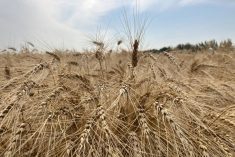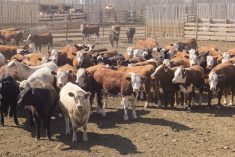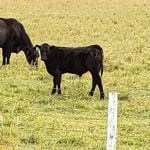Canada’s federal food inspection agency and its cattle producers’ association have both moved to defuse a potentially explosive network TV report on the standards of inspection at XL Foods’ beleaguered Lakeside beef plant.
A report on CTV Wednesday cited memos from Canadian Food Inspection Agency (CFIA) supervisors to agency inspectors at XL’s Brooks, Alta. beef plant.
CTV’s report alleged the memos "instructed CFIA inspectors stationed at one of the plant’s final inspection stops to give extra scrutiny to carcasses shipped to Japan, but to ignore visible fecal and intestinal contamination on meat for Canadians."
Read Also

U.S. livestock: Feeder cattle hit contract highs on tight supply
Chicago | Reuters – All Chicago Mercantile Exchange feeder cattle futures and most live cattle futures hit contract highs on…
A copy of one such 2011 memo, posted on CTV’s website, explains the duty of an inspection station, called the "Japan Dura-Mater position," which the supervisor said is "specific to 100 (per cent) verification of spinal cord/dura-mater removal of Japan eligible carcasses only. Our (No. 1) priority is to ensure this standard is met with Japan eligible carcasses."
The memo goes on to say the inspector at that station should "ensure that non Japan eligible carcasses are not inspected for spinal cord/dura-mater, OCD defects and minor ingesta (ignore them). CVS task audits and/or HLS OCD/FS tests will cover these items."
"It is incredible that you could allow material to leave the plant that could have contamination on it just because it’s not going to Japan," Doug O’Halloran, president of United Food and Commercial Workers Local 401, which represents the Lakeside plant’s line workers, was quoted by CTV as saying.
"What (the CFIA memo) is saying is that for non-Japan-destined carcasses, don’t worry about seeing minor defects and that the problem will be picked up later on," Bob Kingston, president of Agriculture Union-PSAC, which represents CFIA inspectors, was quoted by CTV as saying.
"But the problem with that is it’s at the end of the inspection line. If it’s not dealt with there, nobody is going to."
Japan today accepts only a limited range of Canadian beef and beef products, after having shut its ports to them entirely upon the discovery of Canada’s first domestic case of BSE in an Alberta cow in 2003.
Canadian beef slaughter plants are required to completely remove and dispose of cattle’s specified risk materials (SRMs) known to harbour the prions that cause BSE, including brain tissue, spinal cords and dura mater (a membrane surrounding the brain and spinal cord).
SRMs since 2007 have been forbidden in Canada from use or rendering in any form of food, animal feed or fertilizer.
Japan agreed in late 2005 to reopen to Canadian beef and beef products, but so far has limited its imports to beef from cattle 20 months of age or younger.
"Confident"
"Within meat plants, there are specific inspection tasks conducted at various stations and production points in production," CFIA said in a statement Thursday. "The memo referenced simply emphasized this division of labour."
"It is important to note that this is not a food safety inspection station in the traditional sense — these activities are addressed at additional points in the process," the Canadian Cattlemen’s Association (CCA) said in a separate statement.
"The CFIA personnel at this location performed activities such as confirming Japan’s requirement that the animal is under 21 months of age. The CFIA memo essentially conveyed that personnel at this station should focus on Japan’s export requirement, while inspection activities related to Canada’s food safety requirement would be addressed by additional personnel dedicated to this purpose."
CFIA on Thursday ripped the CTV report, saying the network’s information about the nature of the memos "was clarified with the (inspectors’) union and front-line inspection staff over three weeks ago when the union first brought their allegations to the CFIA’s attention. It was also explained in detail on two occasions to CTV."
"It is also important to note that there are multiple food safety interventions after this inspection station including carcass pasteurization, multiple antimicrobial sprays, monitoring by plant employees and, in addition, CFIA personnel that verify contamination has been addressed," the CCA added in its statement.
"The statements in the CTV report were incorrect to imply that this station was the last opportunity to address any visible contamination which may have been missed at earlier points in the system."
The CTV story, the CCA said, "also stated that beef for Japan was being produced using different standards. We are confident in Canada’s food safety standards and optimistic Japan will shortly be changing their procedures to align more closely with those already in place in Canada and recommended by the World Organization for Animal Health (OIE)."
Earlier this fall, Japan was reported to have reached an "in-principle" agreement to relax age limits on slaughter cattle from Canada, the U.S., France and the Netherlands.
Japanese media said in September an expert panel was expected to show that BSE-causing prions have not been detected in beef from cattle under the age of 30 months, if SRMs are removed.
XL Foods’ beef plant at Brooks restarted operations on Oct. 29. CFIA had suspended the plant’s federal operating license on Sept. 27 upon findings that some beef shipped from the plant was contaminated with E. coli bacteria that sickened at least 18 people in Canada.
The plant is now operated by JBS, the world’s biggest meat packing company, through a management agreement with XL. The agreement includes an option for JBS to buy the plant.
Related stories:
Japan seen easing beef import rules in early 2013, Sept. 6, 2012
Food inspection budget cuts for CFIA jeered, Jan. 29, 2012
















